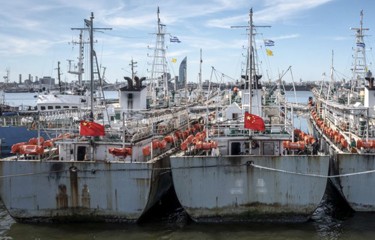China is targeting new fishing agreements in the seas of East Africa and the South Pacific, and is investigating further expansion into Latin America, West Asia, and South Asia, according to a guiding opinion published by the national government, covering the country’s 14th Five-Year Plan (2021 to 2025).
Titled “Opinions on Promoting the High-quality Development of Pelagic Fisheries during the 14th Five-Year Plan,” the document was recently published by China’s Ministry of Agriculture and Rural Affairs (MARA) to provide an outline for the development of the country’s distant-water fishery sector.
The plan calls for the development of the sector so that by 2025, the annual catch of the country’s distant-water fleet “will be stable at around 2.3 million tons.” China calculates its distant-water catch based on volumes landed in China, though a significant portion of the fleet operates in far-off locations around the globe.
The scale of China's distant-water fishing fleet will be “strictly controlled,” according to the ministry's document, but it will receive preferential policy support in areas like vessel refurbishment, building of processing facilities, and marketing, research, and development. The language used in the plan indicates China’s subsidization of its distant-water fleet will continue.
Since its release, the ministry’s document has been circulated by Chinese fishing companies, including CNFC Overseas Fishing Co., which has used the government’s promises of support to boost its share price. The loss-making company recently announced it is seeking to raise more funds from a private placement of shares to expand its tuna fleet.
China’s distant-water fishery has come under increasingly harsh scrutiny from foreign governments and environmental non-governmental organizations. In a new report from the Environmental Justice Foundation titled “The Ever-Widening Net: Mapping the Scale, Nature, and Corporate Structures of Illegal, Unreported, and Unregulated Fishing by the Chinese Distant-Water Fleet,” details widespread illegal fishing, labor abuses, and wildlife poaching committed by the Chinese fleet.
The opacity of Chinese data makes it very hard to scrutinize the scale and impact of the distant-water fleet, according to the report, which criticizes the “fractured and contradictory” fisheries policymaking and rules enforcement at the national and regional levels in China. In the report, EJF concludes that a lack of data published by MARA on the country’s distant-water fleet is inhibiting the ability of fishery-management bodies and the seafood supply chain to make effective management decisions.
Photo courtesy of Environmental Justice Foundation







